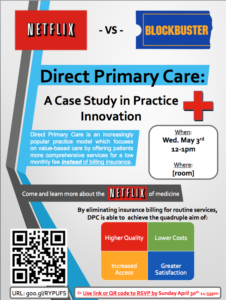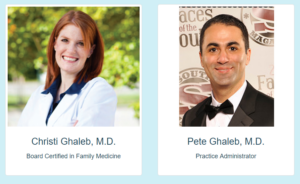
 All are invited to attend a lunch lecture by Drs. Pete and Christi Ghaleb. Direct Primary Care is an increasingly popular practice model which focuses on value-based care by offering patients more comprehensive services for a low monthly fee instead of billing insurance. Like a Netflix subscription for medicine, DPC offers “all you can treat” primary care that is patient-centered, and eliminates traditional Fee-For-Service billing (Blockbuster). Often for only $50/month for most adults, patients receive unlimited office visits, can call/text/email their provider directly, and get free after-hours visits. In addition, patients receive discounts on meds, labs, and imaging—commonly saving over 90%. Primary care doesn’t have to be expensive, and DPC shows why.
All are invited to attend a lunch lecture by Drs. Pete and Christi Ghaleb. Direct Primary Care is an increasingly popular practice model which focuses on value-based care by offering patients more comprehensive services for a low monthly fee instead of billing insurance. Like a Netflix subscription for medicine, DPC offers “all you can treat” primary care that is patient-centered, and eliminates traditional Fee-For-Service billing (Blockbuster). Often for only $50/month for most adults, patients receive unlimited office visits, can call/text/email their provider directly, and get free after-hours visits. In addition, patients receive discounts on meds, labs, and imaging—commonly saving over 90%. Primary care doesn’t have to be expensive, and DPC shows why.
Through this model, DPC creates unprecedented value and is able to achieve the quadruple aim of:
(1) higher quality care,
(2) lower cost of care,
(3) increased access, and
(4) greater patient/physician experience.
This model is included in the Affordable Care Act, and is a hot topic in today’s health policy world because of its positive impact on patient care.
Come sit back and learn about the future of medicine. Lunch will be provided to those who RSVP within 48 hours of the event.
Attendees will asked be asked to participate in a very brief anonymous survey.
POST-EVENT SUMMARY: Eighteen students and faculty attended this lunchtime presentation event for a study being conducted by Will Craghead on DPC’s ability to influence medical students to enter primary care specialty. Pre- & Post-surveys were collected, and lunch was provided.
Dr. Pete Ghaleb did an excellent job at presenting on DPC and its value proposition. His presentation was well accepted by students, and we had a great Q&A session afterwards. All in all, students were very excited about DPC. Dr. Pete was mentored by Dr. Josh Umbehr of Atlas MD, and he patterned his practice model after Josh’s. Pete is also helping other docs start DPC clinics.
One of the questions from a student was regarding DPC creating a shortage. I referred the student to AAFPs report on 2/3 of doc’s time being admin and EMR related, also directed student to recent JAMA article refuting any such shortage: (http://jamanetwork.com/journals/jama/fullarticle/2613209)” ~Will Craghead, event organizer